Baggage Stories
Portland, OR, USA 2006
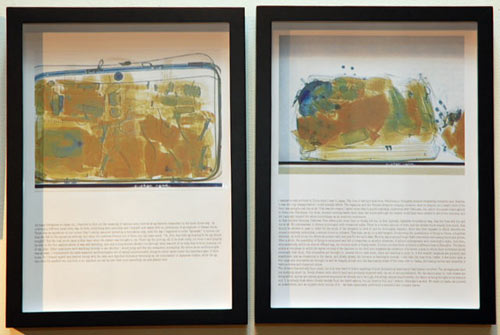
Gordana filmed new color baggage scanners at the Belgrade airport in the Summer of 2000. This was a flight to the Adriatic coast (Tivat, Montenegro), and the X-rays show intimate pieces of life taken on a journey.
Frames from that video were coupled with Marko’s vignettes on journeys, encounters, and intimate places. Japanese vignettes were broadcast on NHK shortwave radio program “Japan Dairy” in 1993, while the Belgrade vignettes come from the first chapter of his book on Serbian national narratives, Serbian Dreambook: National Imaginary in the Time of Milošević.
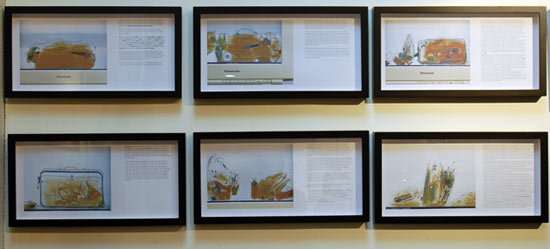
Aji
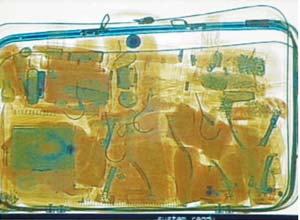 As
many foreigners in Japan do, I resolved to find out the meaning of various
menu entries at my favorite restaurant in the most direct way - by ordering
a different meal every day. At first, everything went smoothly and I enjoyed
new tastes with an excitement of an explorer of distant lands. There was
an aquarium in one corner that I naively assumed served as a decoration
only, until the day I happened to order aji-tataki. It turned out that the
fish in the aquarium were aji, and when the mistress fetched one of them
out, my heart sunk. Oh, God, this little aji is going to be my dinner tonight!
But the real shock came a little later when the platter was brought to me.
There lay the poor aji, all of its flesh deftly cut from it and lying by
its side in the fine sashimi slices. It was still twitching, and only a
long wooden skewer run through what was left of its body kept it from jumping
out of my plate. Other customers were watching intently to see whether I
would jump and flee the restaurant screaming. My honor as an anthropologist
was at stake. I remembered the tales seasoned anthropologists tell of eating
unmentionable things in exotic lands under the expectant gaze of their hosts.
So I braced myself and started dining with the calm and dignified demeanor
becoming an old connoisseur of Japanese cuisine, while the aji, who lived
for another ten minutes or so, watched me eat its own flesh until mercifully
its eyes glazed over.
As
many foreigners in Japan do, I resolved to find out the meaning of various
menu entries at my favorite restaurant in the most direct way - by ordering
a different meal every day. At first, everything went smoothly and I enjoyed
new tastes with an excitement of an explorer of distant lands. There was
an aquarium in one corner that I naively assumed served as a decoration
only, until the day I happened to order aji-tataki. It turned out that the
fish in the aquarium were aji, and when the mistress fetched one of them
out, my heart sunk. Oh, God, this little aji is going to be my dinner tonight!
But the real shock came a little later when the platter was brought to me.
There lay the poor aji, all of its flesh deftly cut from it and lying by
its side in the fine sashimi slices. It was still twitching, and only a
long wooden skewer run through what was left of its body kept it from jumping
out of my plate. Other customers were watching intently to see whether I
would jump and flee the restaurant screaming. My honor as an anthropologist
was at stake. I remembered the tales seasoned anthropologists tell of eating
unmentionable things in exotic lands under the expectant gaze of their hosts.
So I braced myself and started dining with the calm and dignified demeanor
becoming an old connoisseur of Japanese cuisine, while the aji, who lived
for another ten minutes or so, watched me eat its own flesh until mercifully
its eyes glazed over.
Belgrade, good morning
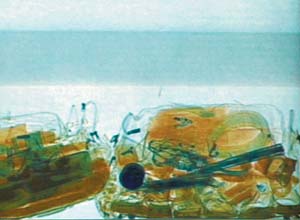 Those
lucky to wake up this morning in Belgrade can assume that they have accomplished
enough in their life for today. To insist on something else in addition
would be immodest. Dusan Radovic, Beograde, dobro jutro.
Those
lucky to wake up this morning in Belgrade can assume that they have accomplished
enough in their life for today. To insist on something else in addition
would be immodest. Dusan Radovic, Beograde, dobro jutro.
This is how, one early July morning in1975, from the top of the tallest Belgrade skyscraper, poet and writer Dusko Radovic greeted the city in what was going to become the legendary radio show, a citys sound-signature, running for just two years, yet leaving a lasting imprint on Belgraders self-understanding and everyday speech. Dusko Radovic was a Yugoslav institution. Generations grew up on his childrens poetry. His voice had a dark, almost misanthropic drone, his aphorisms a bitter, ironic bite. For a while the city had a true sage implanting pithy reminders of decency and common sense (if not wisdom) into the ears of semi-awake parents preparing to go to work, and children packing their schoolbags. His best friend who illustrated all his books, drew him once as a moody hen perched on that skyscrapers top.
Spite
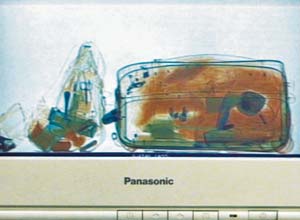 One
Saturday morning in June I decided to go to the farmer's market with my
mother. Dragging the cart on the rough cobblestone between the stalls takes
some skill, and my mother is still better at it than I am. If in a mood,
one can haggle and banter with the vendors who preside over little mountains
of green, yellow and red vegetables. You may pretend to be the most highly
polished urbanite, but most likely you are just barely a generation removed
from the peasant across the stall and that gives the market an egalitarian
feel. Here one glimpses the barrel-chested, bearded figure of a well-known
National Opera baritone buying onions, over there an actress who sang gypsy
songs in an Academy Award winning film of thirty years ago. The tenor is
dressed in worn out, nondescript clothes, the actress in something cheaply
garish.
One
Saturday morning in June I decided to go to the farmer's market with my
mother. Dragging the cart on the rough cobblestone between the stalls takes
some skill, and my mother is still better at it than I am. If in a mood,
one can haggle and banter with the vendors who preside over little mountains
of green, yellow and red vegetables. You may pretend to be the most highly
polished urbanite, but most likely you are just barely a generation removed
from the peasant across the stall and that gives the market an egalitarian
feel. Here one glimpses the barrel-chested, bearded figure of a well-known
National Opera baritone buying onions, over there an actress who sang gypsy
songs in an Academy Award winning film of thirty years ago. The tenor is
dressed in worn out, nondescript clothes, the actress in something cheaply
garish.
We bump into an old acquaintance of my mothers. What are you doing here?
she asks. I am studying the stories Serbs tell themselves and others about
themselves, I give my one-sentence answer. Oh, everybody is studying us
these days, she says; There was this American psychiatrist poking around
who's studying human aggression. But no matter how hard they try, they will
never understand us. They can put us in a computer and still they wont understand.
And then with a conspiratorial wink towards a fellow native: Take for instance,
our inat.
Inat is supposed to be one of those ineffable essences of being a Serb,
thus by definition untranslatable. We may bewail the foolishness of doing
completely irrational, often self-destructive things just in spite, but
we also think of inat as unfathomably noble. I take a stab with my little
test: It is a Turkish word. Oh no, she says with the air of indulgent superiority,
many of those words we thought were from Turkish are in fact Sanskrit. They
might be Persian or Arabic in origin, I persist, but they came through Turkish.
No, she wouldnt budge, you must surely know that Serbian is practically
identical with Sanskrit, and besides, you shoud look into the Hittites as
well.
With the full cart my mother and I walk back home through the streets of
Chubura. Shabby little houses interspersed with dilapidated villas, inner
courtyards with the water tap in the middle where Chuburians gather for
coffee, gossip, even a haircut in the open. Chubura. There is something
rough about the sound, something burly, uncouth, not quite respectable,
yet all the more worthy of fierce loyalty. It is a Turkish word.
Dance
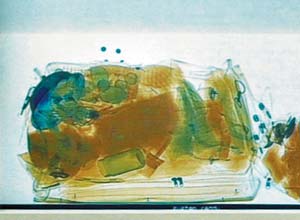 I
wanted to visit a friend in China when I was in Japan. The idea of taking
a boat from Yokohama to Shanghai seemed irresistibly romantic and, besides,
it was the only transportation I could actually afford. The Japanese and
the Chinese shipping company, however, were in dispute, so it wasnt sure
if the ferry was going to sail out at all. That was the reason I spent more
than a month regularly conferring with Habu-san, the owner of a small travel
agency in downtown Yokohama. Our final, decisive meeting lasted more than
two hours although the matter could have been settled in about ten minutes,
and yet I actually enjoyed the whole interchange as an aesthetic experience.
I
wanted to visit a friend in China when I was in Japan. The idea of taking
a boat from Yokohama to Shanghai seemed irresistibly romantic and, besides,
it was the only transportation I could actually afford. The Japanese and
the Chinese shipping company, however, were in dispute, so it wasnt sure
if the ferry was going to sail out at all. That was the reason I spent more
than a month regularly conferring with Habu-san, the owner of a small travel
agency in downtown Yokohama. Our final, decisive meeting lasted more than
two hours although the matter could have been settled in about ten minutes,
and yet I actually enjoyed the whole interchange as an aesthetic experience.
At that decisive meeting, Habu-san first takes quite some time to finally
tell me, in that typically Japanese roundabout way, that the boat will not
sail out at all. We commiserate in silence punctuated with occasional sighs.
There is a certain amount of time, and the artists know exactly how much,
that should be allowed to pass in order for the truth of the situation to
sink in and be thoroughly digested. After this first impasse in which dancers
are almost completely motionless, a second round is initiated. This time,
we go on a wild tangent of exploring the possibilities of flying to China,
a hopeless direction, we both know, but which we pursue with zeal just for
the arts sake. We now dance around huge flight time-tables discussing times
and prices. After a while, the possibility of flying is exhausted and left
to evaporate in another slowdown of silence interspersed with meaningful
sighs. And then, very tentatively, and in an almost offhand way, the decisive
move is finally made. It turns out that there is indeed a different boat
to Shanghai. The dance enters a new phase in which the spiral circling of
the dancers for the first time suggests the existence of a center, a goal
to which their movement would eventually lead them. New timetables are brought
in, several phone calls made, faxes are starting to pour in. A few smaller
tangents are pursued and abandoned, just as ornaments to the dance, and
slowly, slowly, the decision is starting to emerge - I will take the boat
from Osaka. A few more calls, a few maps and time-tables are brought in
and we happily plunge into the fascinating detail of the train ride to Osaka,
discussing merits and demerits of various trains and departure times.
The decision has actually been made, but it is very hard to notice anything
of such momentous importance had indeed occurred. The protagonists have
not suddenly stood up, firmly shaken each others hand and promptly departed
with the air of accomplishment. No, the dance goes on, new details are being
added, and we are repeating several sequences we already went through, but
slowly, almost imperceptibly, the dance is being brought to its tranquil
end. It is already dusk when I finally emerge from the travel agency, but
my heart is full, and I believe, Habu-sans as well. We made no haste, we
covered all possibilities, and we enjoyed every minute of it we have impeccably
performed a beautiful and complex dance.